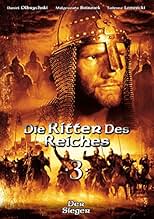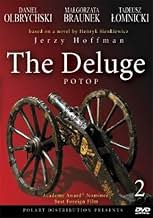Potop
- 1974
- 4 h 47 min
AVALIAÇÃO DA IMDb
7,7/10
3,5 mil
SUA AVALIAÇÃO
Adicionar um enredo no seu idiomaDuring the 1655 war between Protestant Sweden and Catholic Polish-Lithuanian Commonwealth some Polish-Lithuanian nobles side with Swedish king Charles X Gustav while others side with the Pol... Ler tudoDuring the 1655 war between Protestant Sweden and Catholic Polish-Lithuanian Commonwealth some Polish-Lithuanian nobles side with Swedish king Charles X Gustav while others side with the Polish king Jan Kazimierz.During the 1655 war between Protestant Sweden and Catholic Polish-Lithuanian Commonwealth some Polish-Lithuanian nobles side with Swedish king Charles X Gustav while others side with the Polish king Jan Kazimierz.
- Direção
- Roteiristas
- Artistas
- Indicado a 1 Oscar
- 4 vitórias e 1 indicação no total
Avaliações em destaque
What sets Potop ('The Deluge') apart from the majority of international films is that it manages to escape the art-house ghetto that so many are resigned to, and stand on its own as an engaging piece of storytelling with memorably-drawn characters.
Director Jerzy Hoffman had nearly all of this handed to him on a silver platter. Based on the massive second volume of Henryk Sienkiewicz's Polish Trilogy, Potop follows the crimes, tribulations, and redemption of the nobleman Andrei Kmicic, set against the backdrop of the Swedish Invasion of the Polish-Lithuanian Commonwealth. As a historical epic it is unparalleled, akin more to the works of Tolkien than Dumas, and this all comes down to the strength of the narrative, setting, events, and characterizations, all of which are suitably larger-than-life. Sienkiewicz himself would never really top his work here, and it's no surprise that Hoffman's adaption of the third book in the Trilogy (Pan Wolodyjowski, filmed first though it was the third book) did and does not register much. (It's the weakest book of the three by far).
Though its four-hour runtime will probably repel most American viewers, Potop does contain at least one showstopper sequence that earns its place in film history and cult-movie fandom: this is the sword-fight between the desperate Kmicic and the knight Pan Wolodyjowski. The scene only lasts around 5 minutes, but is such a carefully choreographed, Kurosawan wonder (the actors are visibly using real swords) that it is rightfully considered one of film's all-time greatest sword fights. Throughout the film Hoffman shows a keen aptitude for shooting carnage, but possibly at the expense of everything else; he seems to have little interest in cinematic blocking, and the most effective scene from the book (Radziwill's abrupt betrayal) is rendered strangely flat and unaffecting. With a production this massive, however, perhaps expectations should be a bit tempered.
Potop is a curious contrast to another immensely popular Polish blockbuster, 'Krzyzacy' (Knights of the Teutonic Order, also based on a book by Sienkiewicz), and filmed 14 years earlier in 1960. Krzyzacy was a gorgeously made film with cinematography about on par with Hollywood, but was populated by shallow stock characters and driven by (as per the depiction in a the film) a somewhat vapid youthful romance. The romantic angle in Potop is far superior, with the central relationship between Kmicic and Olenka far more developed and emotionally-wrought than that of Krzyzacy. That being said, the cinematography is uglier and the set-pieces simpler in Potop; maybe because of the extended runtime the budget seems somewhat reduced, the filmmaking less professional. The two films are an interesting microcosm of classic filmmaking versus 70s filmmaking; despite the latter's immovable grasp on the hearts of movie fans, it marked a decided decline in the technical professionalism seen during previous decades. Ultimately, however, Potop remains the better film due to its thematic breadth and narrative complexity.
Director Jerzy Hoffman had nearly all of this handed to him on a silver platter. Based on the massive second volume of Henryk Sienkiewicz's Polish Trilogy, Potop follows the crimes, tribulations, and redemption of the nobleman Andrei Kmicic, set against the backdrop of the Swedish Invasion of the Polish-Lithuanian Commonwealth. As a historical epic it is unparalleled, akin more to the works of Tolkien than Dumas, and this all comes down to the strength of the narrative, setting, events, and characterizations, all of which are suitably larger-than-life. Sienkiewicz himself would never really top his work here, and it's no surprise that Hoffman's adaption of the third book in the Trilogy (Pan Wolodyjowski, filmed first though it was the third book) did and does not register much. (It's the weakest book of the three by far).
Though its four-hour runtime will probably repel most American viewers, Potop does contain at least one showstopper sequence that earns its place in film history and cult-movie fandom: this is the sword-fight between the desperate Kmicic and the knight Pan Wolodyjowski. The scene only lasts around 5 minutes, but is such a carefully choreographed, Kurosawan wonder (the actors are visibly using real swords) that it is rightfully considered one of film's all-time greatest sword fights. Throughout the film Hoffman shows a keen aptitude for shooting carnage, but possibly at the expense of everything else; he seems to have little interest in cinematic blocking, and the most effective scene from the book (Radziwill's abrupt betrayal) is rendered strangely flat and unaffecting. With a production this massive, however, perhaps expectations should be a bit tempered.
Potop is a curious contrast to another immensely popular Polish blockbuster, 'Krzyzacy' (Knights of the Teutonic Order, also based on a book by Sienkiewicz), and filmed 14 years earlier in 1960. Krzyzacy was a gorgeously made film with cinematography about on par with Hollywood, but was populated by shallow stock characters and driven by (as per the depiction in a the film) a somewhat vapid youthful romance. The romantic angle in Potop is far superior, with the central relationship between Kmicic and Olenka far more developed and emotionally-wrought than that of Krzyzacy. That being said, the cinematography is uglier and the set-pieces simpler in Potop; maybe because of the extended runtime the budget seems somewhat reduced, the filmmaking less professional. The two films are an interesting microcosm of classic filmmaking versus 70s filmmaking; despite the latter's immovable grasp on the hearts of movie fans, it marked a decided decline in the technical professionalism seen during previous decades. Ultimately, however, Potop remains the better film due to its thematic breadth and narrative complexity.
10slug-5
This movie is an epic tale set in the 17th century Poland
were there is a war between the Swedish and the Polish armies. The turning point of this movie is when a Polish general betrays Poland and kills thousands of olish men. This movie had an academy award nomination but didn't win.
were there is a war between the Swedish and the Polish armies. The turning point of this movie is when a Polish general betrays Poland and kills thousands of olish men. This movie had an academy award nomination but didn't win.
10yelbtrib
Never ever watched a movie to march this wave of involvement of both the makers and a viewer. It leaves one exhausted, transported, elated, weeping and hopeful all at once as well as re-discovering the polish character as a mere tour wont do. All inherent aspects like camerawork, artistry and production surely measure up. Academy awards ain't doing enough credit, to my taste. Me i can think of only 2 other movies of late to shake me thoroughly. But this one shows an altogether different country against what they project these days, a deeper, resolved, committed and mightier one. Not least, they establish a woman the driving force of entire human history. Glory.
10Enzyme7
A grand epic based on the writings of Henryk Sienkiewicz, The Deluge presents to its audience a gritty world saturated with betrayal and ruin, heroism and patriotism. Outstanding costume design paired with a brilliant cast led to a greatly rich depiction of Slavic aristocracy. Daniel Olbrychski's larger-than-life portrayal of Andrzej Kmicic aptly accomplishes the solemn bearing of a nobleman combined with hints of mania and barbarity.
The story engrosses with its beautiful cinematography, excellent character development, and cultural and historical insights into the Polish nation. The Deluge falls nothing short of monumental.
The story engrosses with its beautiful cinematography, excellent character development, and cultural and historical insights into the Polish nation. The Deluge falls nothing short of monumental.
I'd just like to add that "The Deluge" contained the best battle scenes made for the next 20 years till the movie "Barveheart", but even now they're still impressing. Hoffman managed to do that without any special effects and in the times when Poland was a communistic country and the budget was smaller than the amount of money middle class actors in Hollywood get now paid.
Except the battle scenes, it's impossible to not see the wonderful costumes and decorations. They're not only beautiful, but they create the climate of the 17th century better, than the often artificial decorations in Hollywood movies made for any century.
The film's time is about six hours. To tell the truth, I doubt that the Americans would have made this movie nowadays for less than a 100 mln $. Jerzy Hoffman could have dreamed at the best of that kind of money for his film and still, he made one of the best movies in history of cinema and the best in the history of Polish cinema.
Except the battle scenes, it's impossible to not see the wonderful costumes and decorations. They're not only beautiful, but they create the climate of the 17th century better, than the often artificial decorations in Hollywood movies made for any century.
The film's time is about six hours. To tell the truth, I doubt that the Americans would have made this movie nowadays for less than a 100 mln $. Jerzy Hoffman could have dreamed at the best of that kind of money for his film and still, he made one of the best movies in history of cinema and the best in the history of Polish cinema.
Você sabia?
- CuriosidadesThe third most popular film in the history of Polish cinema, with more than 27.6 million tickets sold in its native country by 1987, and 30.5 million sold in the Soviet Union.
- ConexõesFeatured in Sexify: Episode #1.6 (2021)
Principais escolhas
Faça login para avaliar e ver a lista de recomendações personalizadas
- How long is The Deluge?Fornecido pela Alexa
Detalhes
- Data de lançamento
- Países de origem
- Idioma
- Também conhecido como
- The Deluge
- Locações de filme
- Pidhirtsi, Lviv Oblast, Ucrânia(battle scenes)
- Empresas de produção
- Consulte mais créditos da empresa na IMDbPro
Bilheteria
- Orçamento
- PLN 100.000.000 (estimativa)
Contribua para esta página
Sugerir uma alteração ou adicionar conteúdo ausente








































